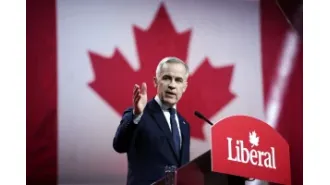The map displays London's voting patterns in the General Election, revealing a majority of red.
London's Labour party experienced a dominant victory, backed by strong statistics.

Sir Keir Starmer had every reason to celebrate as he secured a resounding victory in the recent General Election, both nationally and in London. The capital city played a crucial role in Labour's success, with the party winning a staggering 80% of the 73 available seats. This amounted to a total of 59 seats, a significant increase from their 2019 results.
The General Election was a major setback for the Conservative party and their leader, Rishi Sunak. They only managed to secure seven seats, losing 11 of the 18 they previously held. However, the Liberal Democrats were able to hold onto all three of their seats and even gain three more from the Conservatives.
Interestingly, eight out of the nine seats that Labour gained were previously held by the Tories. The only exception was the newly formed constituency of Croydon East. The only loss for Labour in London was the seat held by Jeremy Corbyn, who has been the MP for Islington North for 41 years. This time, he ran as an independent candidate after being expelled from the Labour Party in 2023 by Keir Starmer.
The electoral map of London is now predominantly red, with the exception of a few seats in the west and south west held by the Liberal Democrats. This is in stark contrast to the previous election, where the Conservatives had a stronger presence in the outskirts of the city.
To get the latest updates on the 2024 General Election, be sure to follow The Agency's live blog.
Now, let's take a closer look at some key numbers from the political changes in London. Labour gained a total of nine seats, bringing their total to 59. Of these nine, eight were taken from the Conservatives. On the other hand, the Tories lost 11 seats, leaving them with only seven in the capital. The Liberal Democrats were able to gain three seats from the Conservatives, bringing their total to six in London. Notably, Jeremy Corbyn won the Islington North seat as an independent candidate, making it the only seat not held by one of the main three parties.
Here is a rundown of how each London constituency voted in the General Election and whether there were any changes in the party holding the seat. Barking, Battersea, Bermondsey & Old Southwark, Bethnal Green and Stepney, and many others were all held by Labour. The Tories held on to some seats, such as Bromley and Biggin Hill, Dagenham and Rainham, and Old Bexley and Sidcup. The Liberal Democrats were able to hold onto Kingston & Surbiton, Lewisham West and East Dulwich, and Richmond Park. However, there were some changes, such as Labour gaining seats in Bexleyheath and Crayford, Chelsea and Fulham, and Chipping Barnet. The Tories lost seats in Croydon East, Eltham and Chislehurst, and Finchley and Golders Green. Jeremy Corbyn's win as an independent candidate in Islington North was also a significant change.
In his first speech outside of Downing Street, Sir Keir Starmer acknowledged the trust gap between politicians and the public, and the weariness that it has caused. He emphasized the need for actions, not just words, to heal this wound. He also recognized that public service is a privilege and that the government should treat every person with respect. He promised that his government would serve the people and that politics can be a force for good.
Sir Keir's wife, Victoria Starmer, was by his side as he made his first address as the British Prime Minister. He expressed his gratitude to the people for voting for change and for giving Labour the opportunity to lead the country after 14 years of Conservative rule. He acknowledged the work that needs to be done to rebuild Britain and promised to start immediately. He ended his speech with a strong message of unity, emphasizing that the country can move forward together.










